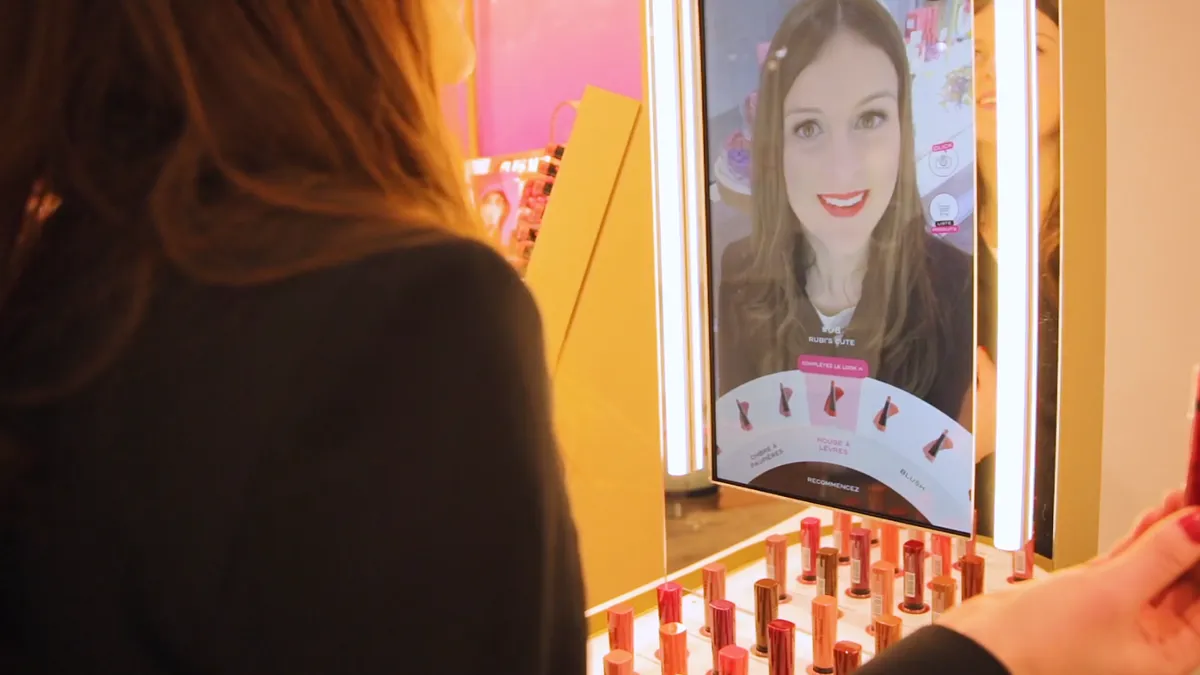Brief:
- Beauty company Coty debuted a blended reality mirror that lets visitors at its Bourjois boutique in Paris test out lipstick before making a purchase. When a shopper picks up a lipstick, the color is virtually placed on their lips through the mirror's technology, according to a press release shared with Mobile Marketer.
- The "Magic Mirror" virtual try-on lets shoppers test a variety of makeup looks on their face even when physical test samples aren't available, while also eliminating hygiene concerns from sharing products and color distortions from shoppers trying on multiple shades of lipsticks while browsing. Coty's in-store connected mirror, developed with Holition and retail marketing platform Perch, features the Bourjois Rouge Velvet Lipstick collection.
- Shoppers can add on-screen eye makeup and blush matched to their skin tone to give them a complete look for more informed decision making. The Magic Mirror also has a selfie function that includes details on the products shoppers tried on, which shoppers can then print in stores or email for future reference.
Insight:
Coty's new Magic Mirror shows how augmented reality (AR) technology can transform the in-store experience for shoppers by letting them quickly test out products before making a purchase. Coty isn't alone in adopting advanced technology to demonstrate its products, as brands like Estee Lauder and L'Oreal have also used similar tools to provide virtual try-ons. The difference, however, is that most beauty brands so far have turned to mobile AR tech that uses a smartphone camera to engage people on the go. MAC Cosmetics rolled out a similar in-store mirror in November.
Coty, in this case, is unique in that its latest in-store feature is activated when a customer takes a product off the shelf. Putting a physical product in shoppers' hands leads to higher purchase intent. About 72% of consumers said they want an in-store beauty experience to be a mixture of both physical and digital elements to make their shopping journey "feel more real and believable," the beauty company found. This strategy leverages the generally higher purchase intent of shoppers that venture into stores to touch, feel and sample products. At the same time, interest in the mirror could help to drive foot traffic to the Bourjois boutique in Paris.
AR in the past few years has become an important way for beauty brands to demonstrate their products more vividly. That's especially true on mobile platforms that younger adults and teens use to browse new products and share their looks on social media. By using AR to demonstrate products, retailers can lead their customers to more accurate expectations, more confidence about purchase decisions and better product satisfaction. One key reason why beauty shoppers haven't yet abandoned in-store shopping altogether is that it's often difficult to get a sense of whether makeup fits a customer's face without sampling it in real life. But even for in-store shoppers, trying on multiple products can still be a headache some consumers want to avoid. That's where in-store tech like Coty's new mirror comes in, as users can sample dozens of styles in a matter of minutes with no waste.














